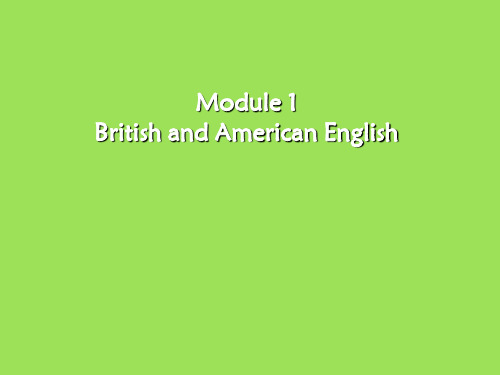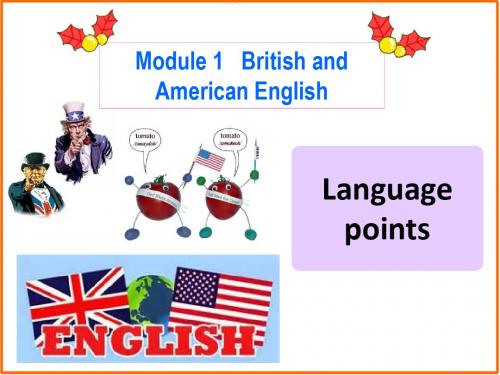高中英语外研版必修五module1讲义()
- 格式:docx
- 大小:14.92 KB
- 文档页数:4






姓名,年级:时间:Choose the best answer according to the text。
1.What is the text mainly about?A.Webster and his best sellers.B.British and American English。
C.The history of American English。
D.The man who made spelling simple。
2.Which is the RIGHT order according to the text?①Webster graduated from Yale University。
②American Dictionary of the English language came out.③Webster's book was selling one million copies a year.④Webster took part in the American War of Independence。
A.②①③④B.③①②④C.④①②③D.①②③④3.What can we learn from the text?A.All the spelling of words does not represent the sound。
B.The Elementary Spelling Book was published in the 1850s. C.Webster’s suggestions were accepted completely。
D.Webster’s dictionary is the best all over the world。
4.What attitude do the British have towards Webster's dictionary?A.They thought highly of it。
Ⅰ.Match the word with its meaning.1.accent A.不断地;持续地2.obvious B.口音3.switch C.评论;讲话4.queue D.比较5.confusing E.种类6.compare F.不同,有区别7.variety G.排队(等候)8.differ H.令人困惑的;难懂的9.remark I.开关10.steadily J.显然的;显而易见的答案:1~5 BJIGH 6~10 DEFCAⅡ.Write down the meaning of phrases in each sentence.1.These things seem different, but they have a lot in common in fact. 有很多共同点2.What you have told me may make a difference to my choice. I have changed my mind now. 有影响3.I wish to get around all over the world one day. 四处旅行4.Sometimes small mistakes can lead to serious trouble. 导致5.This shooting is similar to the one that happened two days ago. 与……相似6.I have difficulty (in) learning maths and I am so worried. 学习有困难We have learnt English for a long time.Do you know in which countries people speak English?The following pictures can help you.A B CD E F答案:A:England;_B:America;_C:Canada;_D:Australia;_E:New_Zealand;_F:South_AfricaⅠ.Fast-readingMatch the following paragraphs with their main ideas.①Paras 1~2 A.Some experts believe that the two varieties are moving closer together. Users of English will all be able to understand each other — wherever they are.②Para 3 B.The first and most obvious way is in the vocabulary. But there are some words and expressions not so well known.③Para 4 C.British English and American English are different in spelling and pronunciation.④Paras 5~7 D.There are a few differences in grammar.答案:①B ②D ③C ④AⅡ.Careful-readingRead the text again and choose the best answer according to the text.1.In which of the following ways do British English and American English most obviously differ?A.Pronunciation. B.Accent.C.Vocabulary. D.Grammar.2.Which of the following statements is NOT true?A.French fries in America are called chips in Britain.B.Many factors have influenced American pronunciation.C.When you visit New York, you need to use the subway.D.Americans use a torch, but for the British, it's a flashlight.3.What causes some people to believe that British English will disappear?A.Many British words and structures are too complex.B.Lots of American words and structures are passing into British English.C.The news and the weather forecasts of the American TV networks are all made in American English.D.Communication between people of the two countries would be much easier.4.According to the text, in the future ________.A.there will be many kinds of “Englishes”B.there will be only two main varietiesC.English speakers will have more difficulty understanding each otherD.only American English will be used in the world答案:1~4 CDBAⅢ.Study-readingAnalyze the following difficult sentences in the text.1.When the Irish writer George Bernard Shaw made the famous remark that the British and the Americans are two nations divided by a common language, he was obviously thinking about the differences.[句式分析][尝试翻译] 当爱尔兰作家乔治·萧伯纳说“英国和美国是被同一种语言分开的两个民族”这句名言时,他显然想到了它们之间的区别。
必修五
module 1
重点语法:
一、非谓语动词
1.doing形式做结果状语,表示顺其自然的结果,常置于句尾,其前面有时加thus
2.to do 做结果状语,表示意外的结果,常置于句尾,用逗号隔开,前面可以加only.
二、介词+关系代词时介词的选择:
1)根据从句中谓语动词的搭配eg. This is the dictionary from which I learnt a lot. 2)根据先行词的搭配习惯eg. I remember the month in which I stayed there./I remember the days during which I lived there.
3)根据从句的意义来确定介词The colorless gas without which we cannot live is called oxygen.
指人用whom,指物用which
三、并列连词:并列:and,both---and---,not only---but also---
转折,对比:but,yet,while结果:so原因:for 祈使句+and/or+陈述句
2.while在---过程中,虽然,而原因状语从句:because ,since ,as, now that ,for
四、虚拟语气中suggest用法(should)+动词原形
五、no matter what与whatever 的区别用法;whatever既可引导名词性从句也可引导状语从句,no matter what只可引导状语从句
六、so far迄今为止与现在完成时态连用,到一个有限的程度eg. You can only
trust him so far.你只能信任他到这种程度。
重点词组:
1.fill up with用---装满,填满fill in填充,填写fill out填写,变大fill away顺风行驶
2.prefer to do /doing ath.喜欢做某事prefer doing---to doing---与做---相比更喜欢做--- prefer to do rather than do宁愿做---而不愿做would do ---rather than do---,would rather do---than do---
3.get around四处走动,传播get across理解,明白gat along with进展,相处get away from逃掉get down to开始认真get rid of去掉,处理get back收回get out泄露get through通过,接通get close to接近get over克服,康复,结束
4.queue up 排队等候=line up
5.confuse A with B把A与B搞混了in confusion不知所措地be confused about对---有疑问lead to confusion造成混乱
6.for example一般只举同类人或物中的一个为例,作插入语such as列举同类人或物中的几个个例子,插在被列举的例子和前面的名词之间,as后没有逗号,列举事物的数量不能等于前面所提事物的总和,若相等用namely或that is用于完全举例
pare--- with---把---与---相比compare---to---把---比作---beyond/without compare无与伦比in comparison to/with与---相比
8.omit----from---从---删去--- omit to do sth.忘记做某事,故意不做某事
9.after all毕竟,到底放在句首时意为别忘了above all最重要的是all in all总的说来and all而且,还not at all一点也不,完全不in all总共,总计
10.more than超过,多于;很;非---所能---,是---难以后接句子。
not more than 不超过,至多no more than仅仅more than one不止一个no more ---than—与---同样不----more---than---与其说---倒不如说---记忆方法:more than用法忒简单,数词、名词常相伴;否定副词前面加,这是词义有变化;加no 此时仅仅说,not 常说不超过。
more than one作主语时,谓语动词应该用单数,意义上表示复数形式。
11.lead to导致,引向lead off开始lead up to造成,引起lead with把---作为头条新闻lead the way带头,带路take the lead in在---方面领先
e out of从---中出来,有---的结果come out真相大白,公开表明,出版(不及物动词)publish及物动词,被动语态
13.on the air播放中,在广播中in the air在传播中,流行up in the air悬而未决in the open air在户外
14.wear off逐渐消失,逐渐减小wear away逐渐磨平wear out穿破,累垮wear down磨损wear on慢慢地过去(时间)
15.add to增加,增添add---to---把---加到---上add up把---加起来add up to总计,总共
16.in favour of支持,同意in sb’s favour有利于某人be all in favour of完全支持---vote/decide in favour of投票/决定支持do sb. a favour帮某人一把ask a favour of---请求---帮忙
17.present sth. to sb./sth.向某人/某地捐赠present sb. with sth.向某人颁发某物present sb. as---把某人描述成---at present目前,现在for the present眼下你,就现在而言up to the present至今be present in/at出席,参加;放在被修饰词之前做目前的,现在的;在被修饰词之后,做出席的,在场的
18.refer to---as---称---为---refer to查阅,参考,提到,谈到appeal to呼吁take to喜欢,逐渐习惯see to 照看,处理stick to坚持object to反对devote to献身,致力于thanks to多亏,幸亏
19.fight against与---作斗争fight for为---而战fight with与---并肩战斗fight on继续作战fight one’s way艰苦奋斗fight over/about争论
20.in/with reference to关于,就---而论make no reference没有提及make a difference有影响,使不相同differ from---(in)(在---方面)与---不同
重点单词辨析
1.criticize找出某人或某物的缺点并加以批评blame责备某人的过错并追究其责
任
2..remark所说的话含有评论性的意思state把事情详细地陈述出来,且含有一定
的目的性
3.attempt努力,尝试obvious显然的variety种类steady持续的,稳定的rapidly
迅速地announce声明,宣告additional另外的,附加的simplify简化
combination组合,结合refer查阅,提到,涉及distinctive与众不同的standard 标准的
4.同于:the same as ,be similar to ,resemble 不同于:differ from, be different from,
vary from 支持:support, favour, approve of,be for
反对:oppose,be opposed to,
object to, be against, disapprove of。